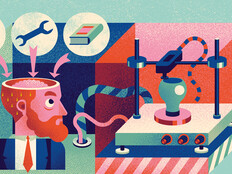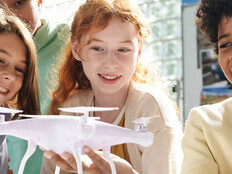How 15-Year-Old Jack Andraka Used STEM to Change the World
The method for detecting pancreatic cancer hasn’t changed in nearly 60 years, but thanks to online research, a curious mind and an appetite for science, 15-year-old Jack Andraka of Crownsville, Md., invented a breakthrough, noninvasive method for detecting the deadly disease.
Andraka’s invention won him the Gordon E. Moore Award from Intel this year, along with $75,000 in scholarship funds, which proves that science isn’t just cool, it also pays.
The Gordon E. Moore Award, named for Intel’s retired chairman/CEO, honors one student finalist for his or her outstanding and innovative research and for the potential impact that work would have in the field and on the world at large. But he wasn’t always so sure his invention would earn him the top prize.
“You look around in the medical category, and it's insane what people are doing,” Andraka says of the Intel International Science and Engineering Fair in which he was competing. “I was walking up and down the aisle and getting less and less confident. One girl created a new way to detect breast cancer using the computer. Mammography is really painful and invasive, but her method was noninvasive.”
In the end, Andraka’s invention prevailed, and he accepted the “Best in Category” award with an emotional display more typical of an Oscar winner.
Andraka’s success story is also a success story for STEM education. Born into a family of scientists, Andraka has been involved in science fairs since sixth grade. His father is a civil engineer, and his older brother, Luke, won an MIT THINK Award last year.
“When I first started, I had simple inventions but they had pretty broad implications,” the Intel honoree says. “Then I started building up to more complex science with molecular implications. I've gone from the macro to micro scale.”
Since winning the Gordon E. Moore Award, Andraka has been on a whirlwind tour of conferences, including the TEDxMidAtlantic conference, which unites innovators, inventors, thinkers and artists to speak on topics of their choosing.
Although Andraka has spoken at several TEDx conferences before, this one was particularly special because it was close enough to home that his mother could attend. For this year’s event, held Oct. 26–27 in Washington, D.C., Andraka relayed the story of his cancer-detecting paper sensor invention.
The Path to Invention
Inspired to take action after a family friend died from pancreatic cancer, Andraka took to the Internet to research as much as he could about the disease. He learned that one of the major problems with treatment is that, for most patients, the cancer is already at an advanced stage by the time it’s detected.
Through his research, he developed a hypothesis: What if mesothelin, a biomarker prominent in pancreatic cancer, could be used to detect the disease at an earlier stage?
The problem with attempting to pinpoint cancer with this biomarker is that it can easily be overlooked among healthy, functional cells in the human body.
Tracking mesothelin “is not just like trying to find a needle in a haystack,” Andraka said at the TEDx conference. “It’s like trying to find a needle in a stack of nearly identical needles.”
But Andraka had an epiphany one day while sitting in his high school biology class: What if he could use carbon nanotubes in his invention? They’re about an atom thick, and he calls them the “superhero” of material science.
Now that Andraka had a rough hypothesis and method for detection, he needed help making his invention a reality. He needed a real lab because, as he acknowledged at the conference, “I can’t do cancer research on my kitchen countertop.”
Andraka turned to higher education research facilities for help. He sent 200 e-mails with a project budget and timeline — and received 199 rejections. As Andraka explained in his TEDx talk, the one person who agreed to work with him, Dr. Anirban Maitra of Johns Hopkins University, did so after a very long interview process. Maitra’s guidance proved to be invaluable, however, and over a seven-month period, Andraka was able to get his invention right.
Over the next few years, Andraka will continue refining the sensor, which doesn’t yet have a product name, and then hand it over to Quest Diagnostics, he says.
The Power of STEM Can’t Be Ignored
If there’s one thing Andraka says he wants everyone to take away from his success, it’s that science can change the world. And in order to foster future innovation, the United States needs to make STEM education a priority.
“STEM, in my opinion, is the best long-term economic policy [for the country]. What we have to be doing is start when they're young. Every kid is a scientist until middle school — then it becomes uncool,” he says.
Andraka wants to see more schools adopt a more experience-based approach to learning. “I would definitely like to see students do more collaborative and discovery learning,” he says. “When you discover what you're being taught, you retain it a lot better.”
The Future Looks Bright
While Andraka is in many ways a whiz kid, in other ways, he’s a typical kid. Despite the complexity of his invention, Andraka continues to be amazed at the connective powers of social media.
“What I found really cool about Facebook is that my friends jumped from 600 to 3,000 [after the Intel award], so now I can talk to all these different people,” he says.
Andraka intends to continue attending high school, but he’s not yet sure if he’ll head straight to college after graduation. It’s still an option, but he’s also considering applying for the Thiel Fellowship, a program that encourages high school graduates to skip college and instead apply the $100,000 award toward a dream project.
But even more exciting than college is his participation with a team of high schoolers for the X Prize, a science innovation competition, in 2015.
“This is the first high school team,” Andraka says. “We are pretty excited and confident we can make it into the finals.”








